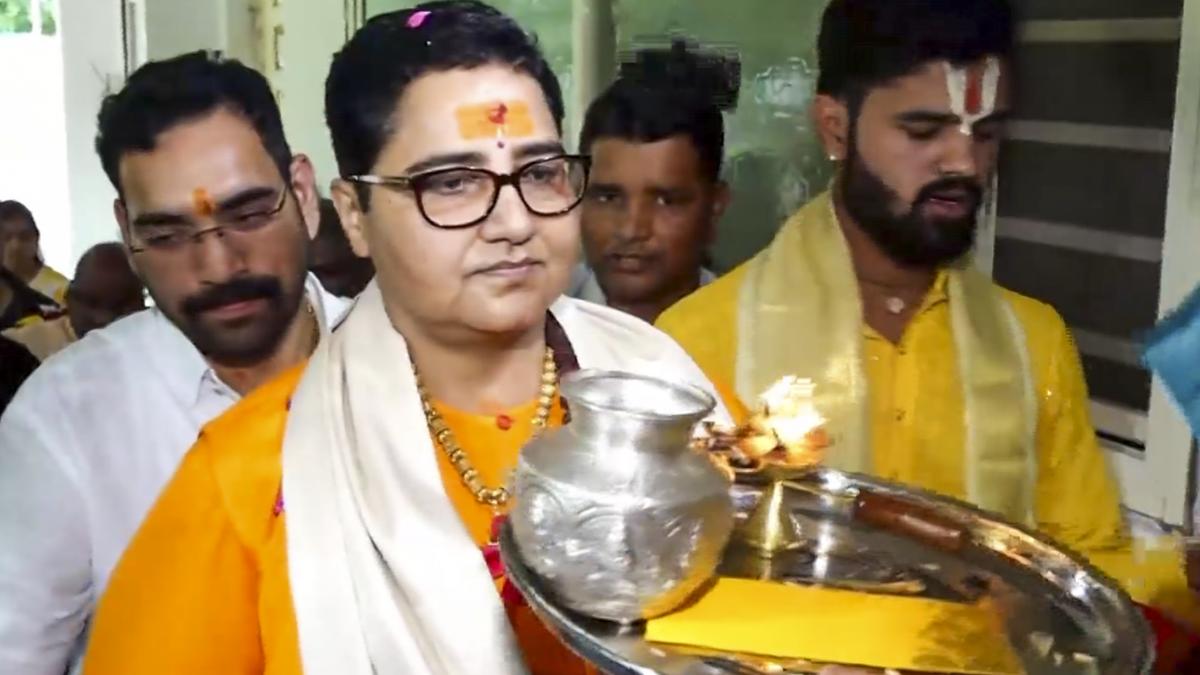
Former BJP MP Pragya Singh Thakur is welcomed at her residence in Bhopal on August 3, 2025 after a special court’s verdict acquitting her in the 2008 Malegaon bomb blast case.
| Photo Credit: PTI
As journalists, we have the privilege and the responsibility of witnessing and writing the first draft of history. We rush in to locations where others desperately try to move away from — the sites of terror attacks, fires, accidents, and other disasters. Though the passion to keep telling stories keeps us going, big tragedies leave us with scars that sometimes take years to heal.
The Mumbai blasts of 2006 and the Malegaon blasts of 2008 are tragedies that the people of Maharashtra will never forget. Hearing the two court judgments in these cases over the last few weeks, I immediately remembered the struggles and flickering hope of some of the victims, and the resilience of the accused.
In July 2010, Mumbai was observing the fourth anniversary of the serial blasts that had ripped through trains on July 11, 2006, killing 189 people and injuring over 800. Just days earlier, the media had been barred from entering the courtroom to cover the trial. I was getting ready to go to a hospital, where victims of the blasts had gathered. Many of them were agitated that the government had not been able to nab the accused, who had allegedly gone to Pakistan. They were also struggling to cope with medical expenses, failing health, and the impact of the injuries caused by the blasts.
One of them was Rajesh Jha. His eardrums had been damaged due to the impact of the blast. The nerves on his left hand had been permanently damaged. Yet, Jha remained surprisingly positive. My brief interaction with him stayed with me for years. Later, Rajesh called to tell me that he had undergone a surgery and had become a chartered accountant.
That was also the time when Parag Sawant had become a symbol of the tragedy. Sawant was going home in a Virar-bound local train in 2006, when a bomb exploded in his compartment at Mira Road station. Sawant’s wife Priti Sawant was pregnant at the time. Sawant had been lying comatose for four years at a hospital and opened his eyes in 2010. His wife said that she was very happy that he recognised her. But this was not a story that ended well — nine years after the blasts, Sawant succumbed to his injuries.
While the victims’ stories spoke of the senselessness of the tragedy, the trial moved at a snail’s pace. In 2015, one of the accused, Ehtesham Siddique, was given the death sentence by a trial court. He was acquitted by the Bombay High Court recently. Every time I walked into court, I would hear that Siddique had filed a fresh Right to Information (RTI) application. Siddique filed hundreds of RTIs seeking to know whether the officer who had conducted the identification parade was authorised to do so, information on the log book entries of the vehicles cited in the probe, call detail records of the accused, and so on. He sought writing material and enrolled himself in educational courses. Siddiqui also wrote a memoir about the blasts and how he was falsely implicated, titled Horror Saga. Eventually, it was due to the efforts of Siddique and others, who relentlessly filed RTIs, that the prosecution’s case collapsed. The Anti-Terrorism Squad had to admit to the Bombay High Court that it did not have the call detail records, a crucial piece of evidence. Can anything compensate Siddique and others for the loss of the years that they spent in jail?
I also remember the frustration and agitation of a senior public prosecutor who was asked to “go soft” on the accused of the 2008 Malegaon blasts, including former MP Sadhvi Pragya Singh. While some of the accused in the Mumbai train blasts case had alleged that they had been tortured in prison, the senior public prosecutor said that a few of the accused in the Malegaon case threw tantrums in jail, refusing to let the staff touch them for routine examinations. Some accused are more equal than others.
After all these trials and tribulations, the victims feel nothing but a sense of hopelessness and pain today. Covering their stories, one cannot help but feel their frustration as well.
Published – August 08, 2025 12:45 am IST
